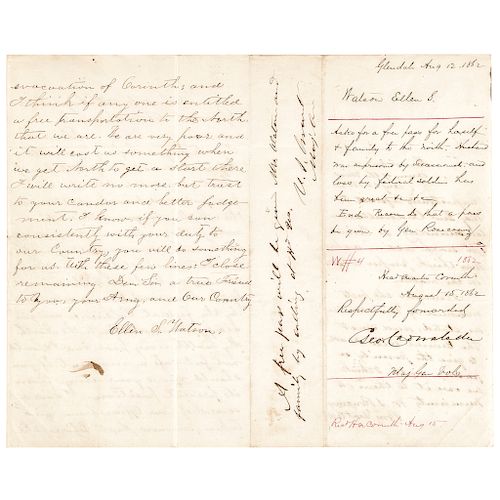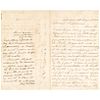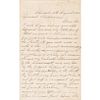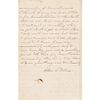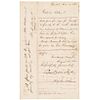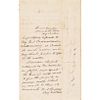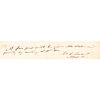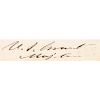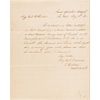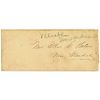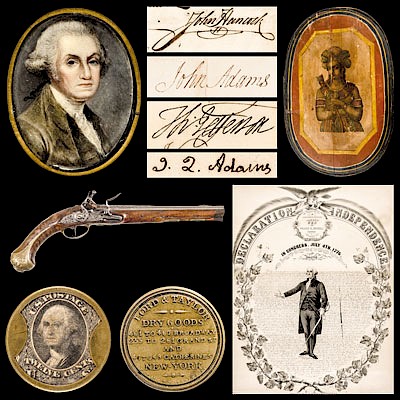Civil War Letter 3 GENERALS U.S. Grant, W. S. Rosecrans + Geo. Cadwalader SIGNED
Lot 33
Estimate:
$2,000 - $3,000
Absentee vs Live bid
Two ways to bid:
- Leave a max absentee bid and the platform will bid on your behalf up to your maximum bid during the live auction.
- Bid live during the auction and your bids will be submitted real-time to the auctioneer.
Bid Increments
| Price | Bid Increment |
|---|---|
| $0 | $10 |
| $200 | $20 |
| $300 | $25 |
| $500 | $50 |
| $1,000 | $100 |
| $2,000 | $200 |
| $3,000 | $250 |
| $5,000 | $500 |
| $10,000 | $1,000 |
| $20,000 | $2,000 |
| $30,000 | $2,500 |
| $50,000 | $5,000 |
| $100,000 | $10,000 |
| $200,000 | $20,000 |
| $300,000 | $25,000 |
| $500,000 | $50,000 |
About Auction
By Early American History Auctions
Jun 1, 2019
Set Reminder
2019-06-01 12:00:00
2019-06-01 12:00:00
America/New_York
Bidsquare
Bidsquare : Historic Autographs, Colonial Currency, Political Americana & Revolutionary War Era
https://www.bidsquare.com/auctions/early-american-history-auctions/historic-autographs-colonial-currency-political-americana-revolutionary-war-era-4152
Historic Autographs, Coins, Currency, Political, Americana, Historic Weaponry and Guns, John Adams, Thomas Jefferson, Early American History Auctions auctions@earlyamerican.com
Historic Autographs, Coins, Currency, Political, Americana, Historic Weaponry and Guns, John Adams, Thomas Jefferson, Early American History Auctions auctions@earlyamerican.com
- Lot Description
Autographs
Three Civil War Union Major Genreals Approve a
"free pass and transportation to the North"
Signed "U. S. Grant"; "W. S. Rosecrans"
& "Geo. Cadwalader"
ULYSSES S. GRANT (1822-1885). 18th U.S. President from 1869 to 1877. During the American Civil War Grant led the Union Army as its Commanding General to victory over the Confederacy in the last years of the Civil War with the supervision of President Abraham Lincoln; First Lieutenant-General since George Washington.
August 12, 1862 Civil War Period, Multipage well written and extremely clean attractive Letter with a Manuscript Autograph Endorsement Note Signed, "U.S. Grant Maj. Gen" as Commanding General Army of the Tennessee, measuring 8" x 9.75", Glendale (Mississippi), Very Fine. The town of Glen, located 9 miles (14 km) southeast of Corinth, owes its beginning to the Memphis & Charleston Railroad. Glen was originally called "Glendale" and is marked as such on old railroad maps.
This very unique historic Autograph Letter and Document that has been Signed by Three Highest Ranking Union Major Generals including: "U.(lysses) S. Grant Maj. Gen", also August 13, 1862-Dated Autograph Letter portion added Signed, "W. S. Rosecrans Brig Genl USA", plus a further Endorsement Signed, "Geo. Cadwalader" (1806-1879) as Major General of Volunteers. On May 25, 1862, Cadwalader was commissioned Major General in the United States Volunteers. Cadwalader later commanded the post at Corinth, Mississippi. This sequence of review and authorization a consequence of the Siege of Corinth (also known as the First Battle of Corinth) was an American Civil War engagement lasting from April 29 to May 30, 1862, in Corinth, Mississippi.
The originating Letter is from Ellen S. Watson, sent to Union Major General William Rosecrans, asking for a "free pass and transportation to the North," 2 pages, measuring 8" x 9.75", Choice Very Fine. Watson explains that she and her family were evacuated from Corinth (Mississippi) and her husband was imprisoned by Secessionists. She goes on to say, "I saved several of your Officers from being taken prisoner just before the evacuation of Corinth; and I think if any one is entitled a free transportation to the North, that we are."
Present on this same Letter are all 3 Union Major General's Endorsements. A separate Letter, 1 page, measuring 7.75" x 9.75" is written for General Rosecrans by his aide, directed to Union Brigadier General McPherson. The Letter reads:
"The enclosed is a letter Endorsed by Genl Grant from a man named Watson a stone mason living East of Corinth on the Memphis and Charlestown R.R. He is in Corinth. The General saw him at the Depot this Evening. You will please see that the enclosed letter is delivered..." Lot also Includes the period yellow Civil War period wove paper Handwritten Transmittal Envelope for the approvals (collector noted in blue "Valuable Grant endorsement" on its face), addressed to: "Mrs. Ellen S. Watson - Near Glendale".
An exceptional piece of Civil War History containing a firsthand account by Ellen Watson, reviewed and receiving the War-Date Endorsement Signatures of Union Generals U.S. Grant, William S. Rosecrans, and George Cadwalader. (3 items).
William Starke Rosecrans (1819-1898) was an American inventor, coal-oil company executive, diplomat, politician, and U.S. Army officer. He gained fame for his role as a Union general during the American Civil War. He was the victor at prominent Western Theater battles, but his military career was effectively ended following his disastrous defeat at the Battle of Chickamauga in 1863.
Rosecrans graduated in 1842 from the United States Military Academy where he served in engineering assignments as well as a professor before leaving the Army to pursue a career in civil engineering. At the start of the Civil War, leading troops from Ohio, he achieved early combat success in western Virginia.
In 1862 in the Western Theater, he won the battles of Iuka and Corinth while under the command of Maj. Gen. Ulysses S. Grant. His brusque, outspoken manner and willingness to quarrel openly with superiors caused a professional rivalry with Grant (as well as with Secretary of War Edwin M. Stanton) that would adversely affect Rosecrans' career.
Given command of the Army of the Cumberland, he fought against Confederate Gen. Braxton Bragg at Stones River, and later outmaneuvered him in the brilliant Tullahoma Campaign, driving the Confederates from Middle Tennessee.
His strategic movements then caused Bragg to abandon the critical city of Chattanooga, but Rosecrans' pursuit of Bragg ended during the bloody Battle of Chickamauga, where his unfortunately worded order mistakenly opened a gap in the Union line and Rosecrans and a third of his army were swept from the field. Besieged in Chattanooga, Rosecrans was relieved of command by Grant.
Following his humiliating defeat, Rosecrans was reassigned to command the Department of Missouri, where he opposed Price's Raid.
Rosecrans was briefly considered as a vice presidential running mate for Abraham Lincoln in 1864 but the telegram correspondence Rosecrans sent back to Washington that stated his interest, was intercepted by Stanton, who buried the message. As a result, Lincoln never received his response and began looking for other candidates.
After the war, he served in diplomatic and appointed political positions and in 1880 was elected to Congress, representing California.
George Cadwalader (May 16, 1806 - February 3, 1879) was a General in the United States Army during the Mexican-American War and American Civil War. When the Civil War broke out, Cadwalader immediately volunteered his services to the Union cause. Due to his distinguished military experience, he was appointed major general of Pennsylvania Volunteers by Governor Andrew Curtin in April 1861.
On May 15, he was appointed military commander in Maryland, where Union communications were being threatened by local Confederate sympathizers. On May 25, he ordered the arrest of John Merryman, who had been recruiting soldiers for the Confederate army. When Chief Justice Taney issued a writ of habeas corpus for Merryman, Cadwalader ignored him, stating that he was authorized by the President to suspend habeas corpus. This dispute resulted in the important case of Ex parte Merryman.
Cadwalader later took command of the 1st Division in Robert Patterson's Army of the Shenandoah. On May 25, 1862, he was commissioned Major General in the United States Volunteers. Cadwalader later commanded the post at Corinth, Mississippi. He returned to Pennsylvania and commanded the post at Philadelphia and successively the District of Philadelphia, the District of the Brandywine, and the District of the Susquehanna before resigning in July 1865. He spent the remainder of his life in Philadelphia.
In April 1865, General Cadwalader helped found the Military Order of the Loyal Legion of the United States (MOLLUS), a quasi-fraternal organization for former Union Army and Navy officers. He was a member of the Pennsylvania commandery and received MOLLUS insignia number 60. He served as Commander-in-Chief of the Loyal Legion from its founding until his death. Cadwalader died in Philadelphia on February 3, 1879.
The Siege of Corinth (also known as the First Battle of Corinth) was an American Civil War engagement lasting from April 29 to May 30, 1862, in Corinth, Mississippi. A collection of Union forces under the overall command of Major General Henry Halleck engaged in a month-long siege of the city, whose Confederate occupants were commanded by General P.G.T. Beauregard. The siege resulted in the capture of the town by Federal forces.
The town was a strategic point at the junction of two vital railroad lines, the Mobile and Ohio Railroad and the Memphis and Charleston Railroad. Former Confederate Secretary of War LeRoy Pope Walker called this intersection "the vertebrae of the Confederacy".
General Halleck argued: "Richmond and Corinth are now the great strategic points of the war, and our success at these points should be insured at all hazards". Another reason for the town's importance was that, if captured by Union forces, it would threaten the security of Chattanooga and render Southern control of the track west of that East Tennessee bastion meaningless.
The siege ended when the outnumbered Confederates withdrew on May 29. This effectively cut off the prospect of further Confederate attempts to regain western Tennessee. The Union forces under Ulysses S. Grant took control and made it the base for Grant's operations to seize control of the Mississippi River Valley, and especially the Confederate stronghold of Vicksburg, Mississippi. Grant later within his memoirs would recall the importance Corinth held in the cause to a Union victory in the region: "Corinth was a valuable strategic point for the enemy to hold, and consequently a valuable one for us to possess ourselves of".
General C. S. Hamilton would later recount that the importance of Corinth was summed up as such: "The Confederate armies had been driven from the Ohio River, almost out of the States of Tennessee and Kentucky a steadying back for a distance of 200 miles Federal occupation reaching the Gulf States where chivalrous foes had been sure Yankee would never set foot".
Sherman too would later write of the importance that Corinth held after the Second Battle of Corinth was concluded: "In Memphis I could see its effects upon the citizens, and they openly admitted that their cause had sustained a death-blow".
With the siege of Corinth completed, Federal troops had the opportunity to strike towards Vicksburg or Chattanooga, but it would be after the Second Battle of Corinth that October that Grant could strike for Vicksburg.
The Siege of Corinth was described by General Sherman as a change in the tactics in West Tennessee: "The effect of the battle of Corinth was very great. It was, indeed, a decisive blow to the Confederate cause in our quarter, and changed the whole aspect of affairs in West Tennessee. From the timid defensive we were at once enabled to assume the bold offensive"
- Shipping Info
-
Early American provides in-house worldwide shipping. Please contact us directly if you have questions about your specific shipping requirements.
-
- Buyer's Premium



 EUR
EUR CAD
CAD AUD
AUD GBP
GBP MXN
MXN HKD
HKD CNY
CNY MYR
MYR SEK
SEK SGD
SGD CHF
CHF THB
THB